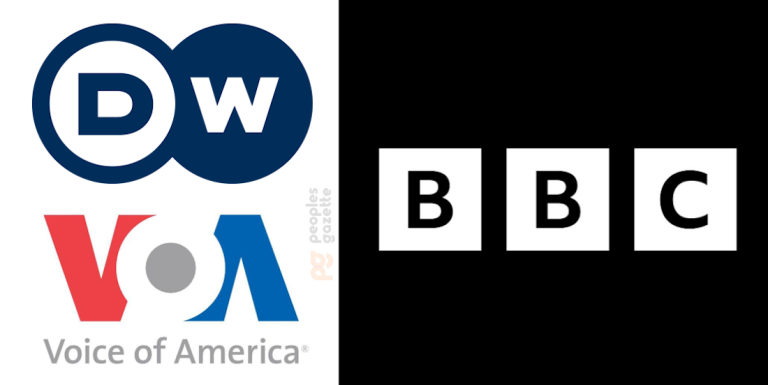
New York, N.Y. — The Trump administration’s controversial shutdown of the U.S.-funded Voice of America (VOA) in March 2025 has sent shockwaves through the international news ecosystem, reducing competition and reshaping how global audiences receive news in English.
This development has opened space for other national broadcasters such as Germany’s Deutsche Welle (DW), the U.K.’s BBC, and Canada’s Global National to expand their influence — but also raises concerns about the growing dominance of state-backed media with varying editorial standards.
The Fall of Voice of America: A Political Move with Global Repercussions
On March 14, 2025, the Trump administration issued an executive order that effectively defunded the U.S. Agency for Global Media (USAGM), the parent organization of VOA and other networks like Radio Free Europe/Radio Liberty. This drastic action led to VOA going off-air, with over 1,200 journalists and staff displaced.
- Legal Pushback: A federal judge swiftly intervened, temporarily blocking the mass firings and labeling the administration’s decision “arbitrary and capricious.” The ruling emphasized the importance of VOA’s role in providing independent news to 360 million people worldwide.
- Accusations of Bias: The White House accused VOA of promoting “leftist propaganda” and undermining American values, citing its coverage of social justice issues and critical reporting on the Trump administration. This rhetoric framed VOA as a “Voice of Radical America,” justifying the shutdown in political terms.
- Global Impact: VOA’s absence has created a vacuum, particularly in regions like Africa, Asia, and the Middle East, where it was a trusted source of balanced news. Media analysts warn this gap risks allowing authoritarian state broadcasters to dominate the airwaves unchecked.
Deutsche Welle Steps into the Spotlight
Germany’s Deutsche Welle (DW), an international broadcaster funded by the German government but protected by the Deutsche Welle Act to ensure editorial independence, has emerged as a key player amid VOA’s silence. Producing content in 30 languages, including English, DW reaches millions worldwide with in-depth reporting on political, social, and economic developments.
- Independent and Diverse: DW’s correspondents across Europe, Africa, and Asia provide nuanced perspectives, combining German and international viewpoints. Its commitment to constructive journalism—highlighting solutions as well as problems—sets it apart in a crowded media market.
- Growing Audience: With VOA off the air, DW has expanded its digital platforms and live broadcasts, aiming to fill the void for audiences seeking reliable, independent news in English. Its transparent editorial policies and legal safeguards against government interference bolster its credibility.
Other National Broadcasters Expanding Reach
Alongside DW, other English-language broadcasters are intensifying their global presence:
British Broadcasting Corporation (BBC)
The BBC remains a global media giant, broadcasting to 468 million weekly viewers in 30 languages. Its editorial independence is guaranteed by a royal charter, and it offers extensive international coverage through correspondents in key cities worldwide.
Canada’s Global National
Canada’s Global National, anchored by Dawna Friesen and Farah Nasser, blends domestic and international news with a Canadian perspective. While smaller in scale than DW or the BBC, it maintains a reputation for balanced reporting.
Other State-Backed English-Language Broadcasters
- China’s CGTN and Russia’s RT continue to promote their governments’ narratives, often criticized for propaganda and disinformation.
- Qatar’s Al Jazeera English provides comprehensive Middle East coverage and is known for its critical stance on Western policies.
Consequences for Global News and Democracy
The VOA shutdown weakens the United States’ ability to project soft power and counter disinformation, especially in contested regions. DW and the BBC, with their strong editorial standards and legal protections, are now more crucial than ever in providing independent news. However, they face the challenge of scaling operations to meet global demand and competing with well-funded state broadcasters that do not adhere to impartiality.
Media experts warn that without VOA, the global media landscape risks becoming more fragmented and polarized. “The loss of VOA’s voice leaves millions without a reliable source of American perspectives,” said media analyst Sarah Klein. “DW and BBC can help fill the gap, but the U.S. retreat is a strategic setback.”
The Future of International Broadcasting
Congress continues to appropriate $860 million annually for USAGM, and legal battles over VOA’s fate are ongoing. Meanwhile, DW is investing in digital innovation and constructive journalism labs to strengthen its global footprint. The BBC is also expanding its international services, while Global National explores partnerships to broaden reach.
As global audiences increasingly seek trustworthy news amid a flood of misinformation, the role of independent broadcasters like Deutsche Welle and the BBC is more vital than ever. The VOA shutdown serves as a stark reminder of how political decisions can reshape the international information environment, with lasting consequences for democracy and global understanding.